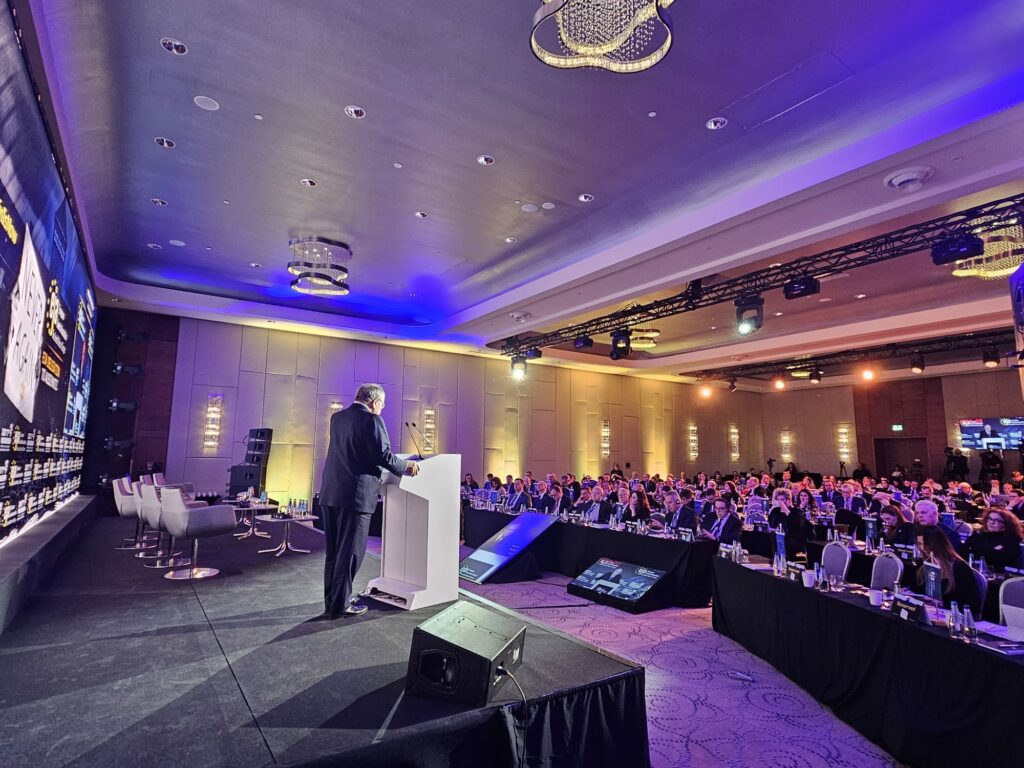The L’obs had interviewed European Jewish Association Chairman, Rabbi Menachem Margolin, as part of L’Obs comprehensive report on the subject of New Anti-Semitism in Europe.
You can find the entire report here:














The L’obs had interviewed European Jewish Association Chairman, Rabbi Menachem Margolin, as part of L’Obs comprehensive report on the subject of New Anti-Semitism in Europe.
You can find the entire report here:















AS DEEP DARKNESS OF ANTISEMITISM SPREADS ACROSS EU – MONTENEGRIN MODEL IS BADLY NEEDED, EU JEWISH CHIEF TELLS PRESIDENT
Brussels 7 March 2019. Rabbi Menachem Margolin, presenting The President of Montenegro Mr Milo Dukanovic with the European King David Award in recognition of his outstanding contribution in supporting and protecting Jews in Montenegro, said his leadership stands in isolation as “the deep darkness of antisemitism spreads across the continent.”
The President met with with Senior representatives of European Jewry, including the chief Rabbi of the Netherlands, the president of the Belgian League against antisemitism, and the Secretary General of B’nei Brith Europe, amongst others, who reported on the rising levels of antisemitism and hate crimes in their countries.
In stark contrast, the President of the Montenegrin Jewish Community Mr Dorde Raicewic and Rabbi Ari Edelkopf, the Rabbi of Montenegro spoke about how Jews are welcomed, how there is no security needed at Jewish buildings and that it is safe to walk the streets.
Rabbi Menachem Margolin, the Chairman of the EJA, prior to presenting the award, said as part of his speech,
“Montenegro may be a relatively small country, but even a small light can burn darkness away.
The deep darkness of antisemitism is spreading across Europe. France, Germany, the Netherlands, Belgium and many others, the oldest hatred is finding its voice again in dark corners and spreading like a malignant virus.
Time and time again we hear European leaders saying enough is enough, but little changes and the darkness keeps spreading.
These countries must embrace and enshrine not only the Montenegrin Model of co-existence, but welcome the country into the European Union where it can provide a leading and immensely valuable role in fighting the scourge of antisemitism. It is deeply ironic that Montenegro must knock on the door to get inside when the country itself is miles ahead of the vast majority of EU countries in protecting freedom of religion and supporting minorities.
“We earnestly thank the President for all his hard work, in helping create and supporting the first synagogue in the country, in the example he sets for others to follow and for his humbling and deep convictions and care when it comes to protecting and nurturing this small but flourishing Jewish community.
My message to all EU Leaders is this: take note, act and share the light of Montenegro now before the darkness consumes us all.”

The EJA is thrilled to share that our delegation to Auschwitz has officially begun. Influential speakers on the alarming surge in antisemitism, community experiences, and enhanced security measures will lead insightful discussions. This gathering is significant as we come together to address this troubling trend.
Esteemed speakers and influential stakeholders will convene to explore these crucial issues.

“For goodness sake, open your eyes, this could just as easily have happened here”say Rabbi Margolin and Chief Rabbi Jacobs in joint statement.
EU Jewish Association (EJA) and Rabbinical Centre of Europe (RCE) Chairman Rabbi Menachem Margolin and Head of Governmental relations at the RCE, Chief Rabbi Binyomin Jacobs (Netherlands) today expressed their support and deep sadness at the synagogue attack in San Diego, that left one lady dead and others injured, including the community Rabbi.
The heads, representing hundreds of communities and thousands of Jews across Europe, also called on EU Leaders to wake up to the festering threat of antisemitism in Europe, adding that an attack such as San Diego’s could just as easily have happened in Leeuwarden, Luxembourg, Łódź, Lille or London.
In a Joint Statement the Rabbis said,
“It is with deep sadness that we learn of the latest attack against Jews in the United States, a despicable and senseless act that has left one dead, and others injured. We extend, on behalf of the EJA, our love and support to the Rabbi there, himself injured, and to his community who will be left reeling from the attack.
“We also take the opportunity, in the strongest terms to tell European Leaders: For goodness sake, open your eyes. Europe is close to a tipping point. There is a festering threat, not seen since the run up to Kristallnacht, that Leaders here must wake up to. Unlike then, leaders have the opportunity to do something now, this very day, to ensure that we avoid attacks in Europe.
“Make no mistake, this latest spate on antisemitism in America isn’t just happening “over there”, its here too in Europe. And sadly, those who believe in such attacks in Europe will be inspired by events in San Diego. Let us be clear, this attack could just have easily taken place in any European City.
“Jewish Communities in Europe no longer need platitudes. They need to know in concrete terms, that governments are prepared to do whatever it takes to root out this vile disease that has risen, once again, from the ashes.”

BUDAPEST (JTA) — Antisemitic sentiment is especially prevalent in Italy and Hungary, according to multiple surveys. But a first-of-its-kind index combining different measures of Jewish experience found that they are also the best countries in Europe for Jews to live in.
The index, unveiled Monday, is based on a study that combines polling data and policy information to create a single quality-of-life metric for Jews in the 12 European Union countries with sizable Jewish communities, according to Daniel Staetsky, a statistician with the London-based Institute for Jewish Policy Research who wrote the report for the European Jewish Association in Brussels.
“The goal with this report is to take the excellent data we already have about how Jews feel, about how prevalent antisemitism is, and combine it with government policy measurables,” Staetsky said during a conference held by the European Jewish Association in Budapest.
He said the results may challenge preconceptions about which EU countries are most hospitable to Jews. For example, Germany scored high when it came to government policies relating to Jews. But Jews there report a weak sense of security, leading to an overall middling score.
The index is primarily a tool “to demand concrete action from European leaders,” Rabbi Menachem Margolin, head of the European Jewish Association. “We welcome statements against antisemitism by European leaders. But more than statements is needed.”
The European Jewish Association will make individual recommendations to each country surveyed, Margolin added at the press event. It was part of a two-day event sponsored by multiple Jewish organizations, including the Consistoire in France, the Jewish Agency for Israel and the Israeli government, about how European Jewish communities can aid the one in Ukraine.
Titled “Europe and Jews, a country index of respect and tolerance towards Jews,” the study gives Belgium, Poland and France the lowest scores with 60, 66, and 68 points out of 100, respectively. The three top countries have 79, 76 and 75 points, followed by Britain and Austria (75), the Netherlands, Sweden, Germany and Spain (74, 73, 72, 70.)
To come up with the ranking, Staetsky gave each surveyed country grades on multiple subjects, including the Jewish sense of security, public attitudes to Jews and the number of Jews who said they’d expereinced antisemitism. The grades were based on major opinion polls in recent years, including those conducted by the Action and Protection League, a group that monitors hate crimes against Jews in several European countries, and the European Union’s Fundamental Rights Agency.
The study combined those scores with scores the author gave to countries’ government policies, including their funding for Jewish communities, whether they had adopted a definition of antisemitism, and the status of Holocaust education and freedom of worship.
Under that scoring system, Germany received an overall score of 72 despite having the best score (89) on government performance on issues related to Jews and a solid 92 when it came to the prevalence of antisemitism. But a relatively low score on Jewish sense of security (46) hurt its overall score, among other factors.
In the case of Hungary, “the score it received reflects the reality on the ground,” according to Shlomo Koves, the head of the Chabad-affiliated EMIH umbrella group of Jewish communities in Hungary. “Jews can walk around here, go to synagogue, without the slightest fear of harassment,” he said.
But the prevalence of antisemitic sentiments in Hungarian society — an Anti-Defamation League survey from 2015 found that about 30% of the population hold them — “shows there is work to be done here, too, in education and outreach,” Koves said.
This article originally appeared on JTA.org.

It’s a challenging time for Jewish communities in Europe. Anti-Semitism is on the rise as populism and the politics of the lowest common denominator are gaining traction. Our communities often need round the clock protection and our practices and customs such as keeping Kosher are under pressure from increasing political interference.
| Cookie | Duration | Description |
|---|---|---|
| cookielawinfo-checkbox-analytics | 11 months | This cookie is set by GDPR Cookie Consent plugin. The cookie is used to store the user consent for the cookies in the category "Analytics". |
| cookielawinfo-checkbox-functional | 11 months | The cookie is set by GDPR cookie consent to record the user consent for the cookies in the category "Functional". |
| cookielawinfo-checkbox-necessary | 11 months | This cookie is set by GDPR Cookie Consent plugin. The cookies is used to store the user consent for the cookies in the category "Necessary". |
| cookielawinfo-checkbox-others | 11 months | This cookie is set by GDPR Cookie Consent plugin. The cookie is used to store the user consent for the cookies in the category "Other. |
| cookielawinfo-checkbox-performance | 11 months | This cookie is set by GDPR Cookie Consent plugin. The cookie is used to store the user consent for the cookies in the category "Performance". |
| viewed_cookie_policy | 11 months | The cookie is set by the GDPR Cookie Consent plugin and is used to store whether or not user has consented to the use of cookies. It does not store any personal data. |